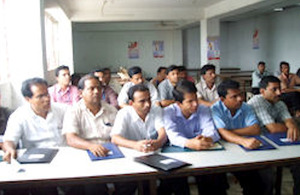DFID Research: TB in the workplace – the case of garment workers in Bangladesh
Improving the health of factory workers in the Bangladesh garment industry through promotion of TB control in the workplace

Orientation workshop for garment factory managers and workers. Picture: COMDIS
In Bangladesh, TB is still a major public health problem. While TB is most likely to be spread between members of the same family, regular, close contact with colleagues at work also presents a high risk to the spread of TB.
TB is a workplace issue because health is essential not only to the well-being of individuals but also the functioning of economies. The garment industry of Bangladesh provides employment to about 3 million workers of whom 90% are women. Factories range in size from hundreds to tens of thousands of workers. The Communicable diseases: vulnerability, risk and poverty (COMDIS) RPC recognised that there was an opportunity to promote and undertake TB control in garment factories and in neighbouring communities.
It did this by developing the Public-Private Partnership Project, in collaboration with the Bangladesh Garment Manufacturer and Exporter Association and National Tuberculosis Control Program.
A survey was used to enlist around 170 mid-size garment factories to the programme in the capital Dhaka, reaching an estimated 15 thousand people. Once enlisted, COMDIS supported the factories to either establish or strengthen DOTS (Directly Observed Therapy Short-Course) centres within each factory building. These centres are widely used to carry out the WHO-recommended treatment strategy for detection and cure of TB. COMDIS also provided additional supplies where needed and has ensured each centre is staffed with a health worker. Through COMDIS approximately 900 TB patients have undertaken successful DOTS treatment within their factory walls to date.
In order to ensure that factories have undertaken appropriate measures to prevent Tuberculosis, a basic TB Awareness Workshop for factory owners, managers, and senior staff has also been developed. The aim of the training is to provide them with technical information about TB prevention and treatment and motivate them to support their workers in key aspects of TB control in the workplace. The training also focuses on providing them with evidence of the success of TB treatment in order to allay any concerns or fears.
An education programme for garment workers was also simultaneously rolled out. This training includes a general discussion of TB that is facilitated by the use of posters, leaflets and videos - so that workers become aware of the dangers of TB, and understand how to prevent it and treat it. Emphasis is placed on removing the stigma of TB and empowering garment workers to seek care.
COMDIS is currently developing a Tuberculosis Case Management Guidebook and a TB Treatment Algorithm for the National TB Programme of Bangladesh. These guidelines should help improve the quality of TB care in the country. There will be two guides - one directed at Private Medical Practitioners and the other at health service providers, for use in either a standard health clinic or hospital, or in a workplace DOTS centre setting. These guidebooks use research gathered in the initial stages of this project, specific to the Bangladesh context, as well as further research by COMDIS, and have already been piloted in Dhaka. They are currently being reviewed by senior government staff in Bangladesh and are expected to be rolled out to a further two districts prior to a mass printing and dissemination throughout Bangladesh.